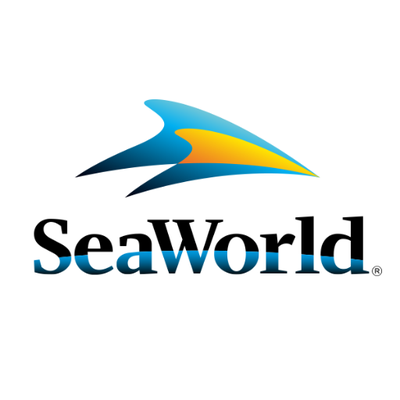
Let's keep the controversy train rolling shall we? This is another one of those posts that I have gone back and forth on for a long time as to whether or not I event want to post it... especially as it is one of the most controversial topics I have covered. I actually started this post a couple months back before I scrapped it in favor of some less heated topics, however recent comments and questions (from both steemians and museum guests) have prompted me to reconsider. While I don't really expect to change any minds on the topic, I thought it might at least be interesting to provide a zoo keeper's opinion about SeaWorld and its animal practices. SeaWorld is an institution that people either passionately embrace or vehemently oppose; there really isn't much middle ground when it comes to public opinion. However, there is so much factual and inaccurate information from both sides of the controversy that I believe it really makes it hard to fully understand what SeaWorld is and does. If nothing else, hopefully this post may help clear up some confusion, and allow readers to draw their own conclusions.
I am a strong supporter of SeaWorld.
Some of you may agree with me, but for others of you who strongly disagree, I implore you to read on and at least try to understand what evidence my support is based on. I haven't always been a supporter of everything SeaWorld is about, but my appreciation for who they are and what they do has increased dramatically, and I can wholeheartedly say I strongly respect the institution and its keepers. I will not deny that SeaWorld, its facilities and practices need some improvement, but I firmly believe the benefits of the organization far, far outweigh the negatives.
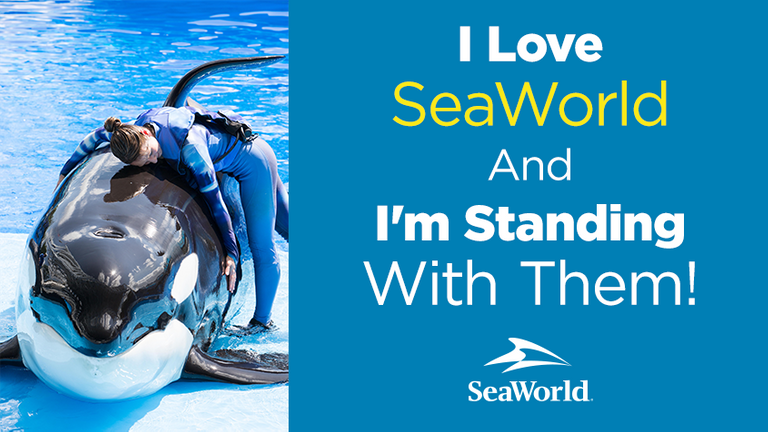
Let's talk about the Orcas (Killer whales):
Let's just cut to the chase: SeaWorld's orcas. One of, if not the most controversial animal program in the world. When it comes to supporting or boycotting SeaWorld, for many it comes down to the orcas and their confinement; in fact, the orcas are much of the reason I used to dislike SeaWorld. I still don't support the captive orca program, but knowing what I now do about animal facilities and care practices, I still feel I can support SeaWorld and their mission.

ORCAS DO NOT BELONG IN CAPTIVITY. PERIOD. You know it, I know it; there really is no great way to keep them in captivity. They require far more space than can be provided by virtually any facility, and they rely heavily on social bonds that often suffer in captivity. This fact is widely recognized by zookeepers around the world; even SeaWorld orca trainers would more than likely tell you that these animals should not be there. The SeaWorld orca program is an unfortunate remnant of a darker time in the history of zoos. Not so long ago, animals were taken out of the wild and penned up in concrete enclosures with iron bars. With fewer regulations, almost no enrichment, and much less understanding about animal nutrition and welfare, animals were living in deplorable conditions. Zoos were more about publicity and money than about education or conservation. Today, things are very different. Facilities are under scrutiny from a multitude of government and private agencies (which we will discuss further shortly). Enrichment programs, enhanced medical presences, and better nutrition allow animals to live longer and healthier lives. In most instances, animals aren't even taken from the wild anymore; instead they come from captive breeding programs or are surrendered as unwanted pets, unable to survive in the wild. Though zoos are still less favorable than living in the wild, they are a paradise compared to what they once were.
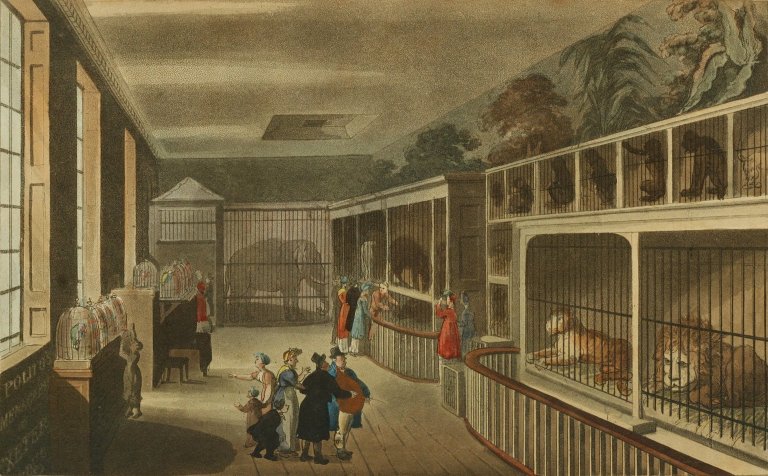
The orca program was born during the same era. The whales were captured and made to perform as a publicity stunt by the Anheuser-Busch Entertainment corporation in their new adventure park in San Diego. When the park was eventually sold to Blackstone Group, it was renamed SeaWorld Entertainment. Over the years, as care and standards have drastically improved, the orca program has clung to life, drawing much public adoration, scrutiny and outrage. "So if the whales don't belong in captivity, why don't we release them?" Unfortunately, they cannot be released, no matter how much we want to. The 22 whales in captivity by SeaWorld rely too heavily on human care, and would likely not be able to survive in the wild. Releasing them could easily be a death sentence if the animals are unable to adapt to life on their own. For them, in human care is their best chance for survival. This is also to the benefit of remaining wild orcas, as the introduction of captive animals could lead to the spread of diseases. It's an extremely unfortunate scenario, but there is good news: in 2016, SeaWorld announced it was ending the captive orca breeding program at all parks and would slowly phase out the orca performances. They have even since begun construction on a new facility in Abu Dhabi, UAE, that will not feature any captive orcas. Once the current generation of orcas passes on, there will be no more captive orcas in SeaWorld Parks.
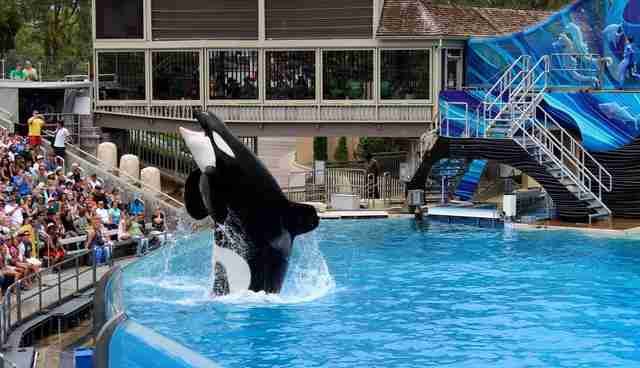
Trying to understand the orca program and its history was the biggest hurdle for me when it came to supporting SeaWorld. It is a program that should not exist, and should never have existed, but the actions the corporation are taking make me feel a little more comfortable with the future of captive animals. I think SeaWorld made a mistake made by many early modern zoos and aquariums, but they are taking the appropriate actions as we learn and understand more about these animals.
Animal shows:
Animal shows are another big controversy, not just for SeaWorld but for animal facilities around the world. Bad enough that we keep these poor animals confined, but making them perform tricks and stunts for human entertainment? It's BARBARIC!!! On the face of it, animal shows might seem like another outdated concept, but believe me when I say, these performances are incredibly beneficial to the health of the animals!
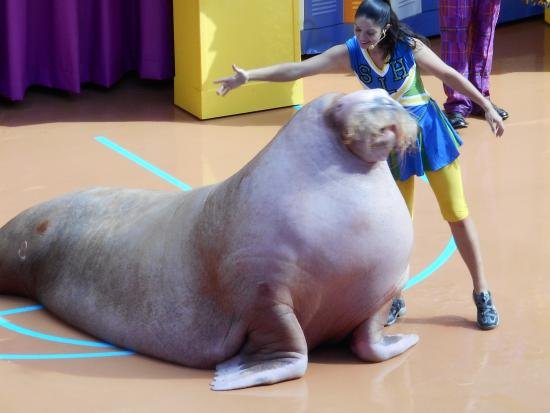
While we might be fascinated by the tricks performed by the animals, there is actually a lot more going on than the audience might appreciate. First and foremost, these programs are a form of enrichment; they actively engage the animal, encouraging them to move and think. Being stuck in captivity can easily lead to boredom among animals, which increases stress levels and even aggression. Enrichment is an activity that promotes both physical and psychological exercise and allows an animal to focus on a particular task or goal. Most of these activities are based around either hunting instincts or simply play.
Training is a huge part of these programs. When I am hosting our facility's alligator show, I am showing off our gator's "tricks" and rewarding her with food upon completion. For guests, these tricks may seem like just fun tricks, but these are important actions for the gator. During animal shows, trainers often have animals roll over, shake hands, lie still or even open their mouths and bear their teeth. These are actually important medical practices; instead of restraining animals for veterinary check-ups and procedures (which is stressful for everyone), we can have them willingly cooperate in exchange for a reward. Animals that roll over and lie still can be easily measured. Shots can quickly and painlessly be given to animals that extend a paw or flipper. Animals that crawl up on a scale by themselves don't need to be restrained and hoisted up. When transporting animals, it's easiest to have them willingly enter their transport enclosure. The next time you watch an animal show, check out exactly what the trainer is doing, and imagine how that action could be beneficial in such a scenario.
Lastly, these shows are a great chance to adequately gauge animal welfare close up. Animal health concerns, such as sickness or injury, can be more easily caught during these shows as we are directly interacting with the animal. Our alligator for example is a relatively laid back and lazy animal; it can be difficult to gauge her health until I get her moving during our program. During one program, we found that she was favoring one leg over the other when swimming, and we were able to correct the issue before it became a larger problem. Some facilities have their animals bare teeth during these shows or roll over for a belly rub; you can be sure that these animals are being looked over carefully for any signs of medical concerns. Always remember, the people who do these shows aren't just paid actors...they are the keepers charged with the animals' care!
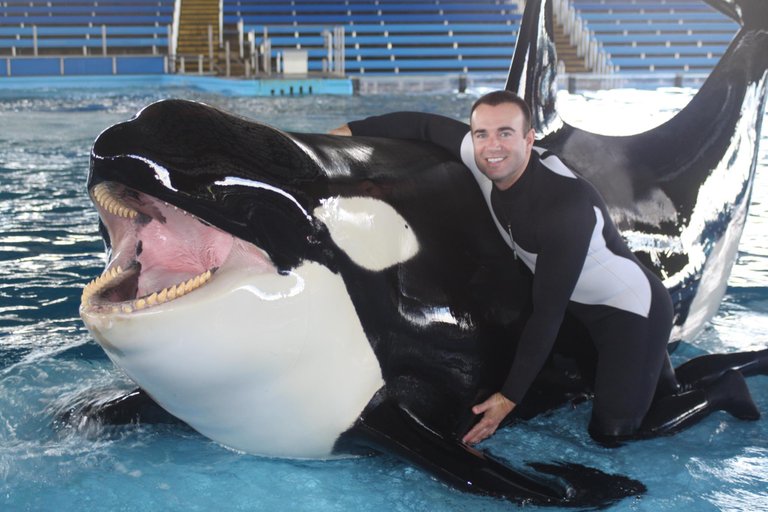
Imagine trying to inspect an orca's teeth if they weren't trained to smile!
SeaWorld is more than a park:
When people think of SeaWorld, they often only think of the theme parks and the orcas. SeaWorld self funds the largest rescue and rehabilitation program in the world. Sea turtles, dolphins, pinnipeds, birds, etc, SeaWorld has led the charge with more than 24,000 successful animal rescues! Operating under federal and state government regulations, SeaWorld rehabilitates hundreds of animals each year. According to regulations, all animals that can be safely released are returned to the environment, while those that cannot legally or medically be released are taken to the parks to be cared for (these are the same regulations that prohibit the release of the orcas). While people have argued for closing the parks while continuing the conservation program, it is a fundamental fact that the structure of SeaWorld parks is integrated with the rescue and rehabilitation program. The level of funding and infrastructure required by the program could not exist without the parks. In other words: If the parks are closed, the largest rescue and rehabilitation program on the planet will end. Source
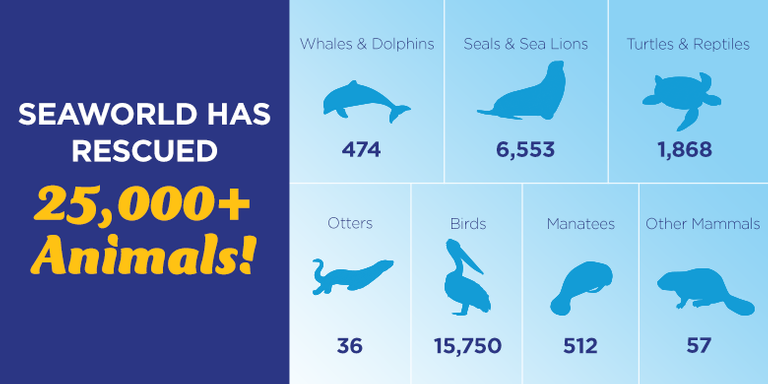
SeaWorld is a massive conservation fund raiser:
Two not-for-profit organizations are run by SeaWorld's parent company. The SeaWorld Busch Gardens Conservation Fund donates millions to land and marine conservation programs all over the planet.

The Hubbs-SeaWorld Research Institute published dozens of peer-reviewed papers on marine life every year, much of which would not be possible without the millions of dollars of funding SeaWorld provides. Like the rescue and rehabilitation program, these funds are largely generated by the theme parks and entertainment side of SeaWorld. Shutting down the parks or ending their animal care programs would mean an end to these programs and their research, much of which is critical for the conservation of many species, including wild orcas.
SeaWorld has the support of the entire zoological system:
Like every other zoo and aquarium in the United States, SeaWorld falls under the jurisdiction of the USDA, National Marine Fisheries Service and National Oceanic and Atmospheric Administration. This means they are held to the same standards that all other institutions are held to, no exceptions. Enclosure size, nutrition, cleanliness, animal inventory, it is all heavily regulated. SeaWorld is also governed by multiple non-governmental organizations, such as the Alliance of Marine Mammal Parks and Aquariums, the Association of Zoos and Aquariums, the International Marine Animal Trainer’s Association, and several others. None of these organizations has ever brought a charge against SeaWorld's animal care, and they have exceeded all mandated standards set forth. Zoos and aquariums around the world take inspiration from the techniques and practices pioneered at SeaWorld, including us!
They’ve done it for the longest time. They’ve done it for the widest range of species. They have the largest zoological collection in the world, and with that comes a huge range of knowledge, skill and techniques, from healthy killer whale blood level databases to parenting behavior in beluga whales to how to perform a C section on a shark. Source

SeaWorld deserves our praise, not our contempt. The claims that they don't care for animals really don't hold up when you appreciate what they do for wild animals and how much they contribute to biological research. It is easy to see them in a negative light when it comes to the captivity of certain species, but the parks are moving in the right direction. In the meantime, the massive funds generated by these practices are being put to use, helping animals around the world. People need to remember that SeaWorld isn't just a big fish tank, it's a conglomeration of concerned scientists and keepers that want to see these species around for a long time to come. It is more than okay to strongly dislike certain programs or practices, I do as well, but we need to understand that SeaWorld may stand between countless species and extinction.
Image Links: 1, 2, 3, 4, 5, 6, 7, 8, 9, 10, 11

This is a great article with a lot of heart and perspective. Thanks for sharing @herpetologyguy!
what about the rollercoasters
SeaWorld loves animals. Maybe they have harmed some and they need to adjust their practices, but their entire existence is to help people learn about and understand species so that we can save them over time.
Yes sir. As long as zoos and aquariums exist, we will have to adjust practices. I have never seen anything but care and compassion from SeaWorld. While I don't love the orcas being in captivity, I do still admit that they are doing impressively well with the resources at their disposal.
This is a very valuable article @herpetologyguy and it´s a really serious discussion, if it is ok to hold whales and other big ocean animals in an aquarium. I want to see them in the ocean while diving for my part! But if the conditions are good, holding endangered animals is great for animal protection. But I don´t like to train them like for the circus for shows, like they are doing it in the seaworld. Thanks for sharing your thoughts about this topic here!
True, I would much rather see them in the wild too!
As for the shows, I actually really like what they do, but again I think it's because I understand what is going on a little better than other audience members. Simply training animals to perform stunts and tricks is not my idea of what zookeeping is about, but these shows are an important opportunity to assess health, set critical training programs in place, and serve as a form of enrichment. After years of being in an animal institution, I would actually say that these shows probably improve their quality of life, and they overall suffer less stress as a result (like I mention in the case of medical procedures). You just have to remember that the shows are more than human entertainment, whether it's obvious or not!
Yes, I totally I agree and it´s a very controversial topic. Maybe the whales are more safe for humans in the seaworld than in the ocean where they are getting killed every day... As I already said, if the conditions are good, it´s a great thing for animal protection and I never visited the sea world, so I can´t say something about the conditions for the animals there.
I wouldn't say the conditions are bad there, I think it is just too difficult to create an artificial environment for an organism as large and complex as a whale, ya know? A species that needs so much space, and with such an intelligent and communal nature, I just don't know how you recreate that in captivity. I'm all for protecting animals using captive programs, but I think we have a ways to go before we can reliably protect whales that way. All species are unique; what works for one animal doesn't always work for another, so perhaps we need to consider that captive programs are not the way to protect whales.
It is said that entertainment is part of human nature. But it shouldn't come at the price of ones life. Animals need to be in their natural habitat, not cooped up and trained to do feats that are not of their norm.
True, but what of the animals that cannot be released, either for legal or medical reasons? In captivity, these animals can serve as critical animal ambassadors, connecting people to wildlife and promoting scientific education. As I said in the post, the animal shows may seem cruel, but they are actually beneficial to the animal when you really understand what is happening (I would never do shows here at our facility if I felt our animals were stressed or suffering as a result!)
Yes, at the end of the day, animals should be in their natural habitat. I will never argue that.
Wow, this is a beautifully written post that I am going to resteem. From one keeper to another thank you for hitting the nail directly on the head!
Woohoo! Finally another keeper on steemit! I gave you a follow; thanks for your kind words!
Amazing!! Thank you 😁
There is one main statement I can subscribe to: whales should not be held in captivity. And that goes for ALL kinds of whales, also dolphins.
Its not that I accuse the keepers of not trying to care for them as best as they can. Its also not the training they exercise with the animals - as you say, thats probably the most positive aspect for the animals.
The problem is, there is no way to provide a environment that comes even close to their needs regarding space. Its a wise move by Sea World to phase out this program, and I can only hope that all other institutions in the world will follow their example.
Of course there are animals, where the situation is completely different. Your Alligator for example would probably move around as much as a oak tree, as long as there is enough food jumping into its mouth on a regular basis.
The decision wether or not to keep animals in captivity, should always be made with this aspect as the top priority. Unless we talk about the last survivors of a dieing species of course.
And yes, education and awareness of the people is important, too. But not on the expense of the animals, in my opinion.
Exactly. I would never say that SeaWorld provides these whales with poor care or bad conditions; I think the level of care is top notch. That being said, I don't think it is possible to recreate the conditions necessary for a whale to thrive in captivity the way other species do. It's not a "animal care problem" as some people put it, it's simply that even with the best care, we cannot create a suitable environment even under the best conditions.
Correct. It would require basins of hundreds, may be thousands of square miles in size. And that even without taking long distance migration into account.
Thats not possible, and even if it would be, it wouldn't make sense, because the visitors would hardly ever get to see the whales. At least not easier than it is now, by going out on the ocean with a ship to observe whales or dolphins.
Passionately and persuasively written. There are a lot of things in the human/animal interaction that are not ideal, but if we grow, and learn, and adjust our relationships, we can take these negatives and make them positive. While I imagine that most zoo animals would not have volunteered for their lives... they aren't all bad. Nature is not the Disney cartoon people portray it to be. There are predators and diseases and famine. While I'm not saying the trade off is perfect, the animals in zoos are kept healthy and at the lowest stress that we know how. And they are adored. We see wild whales and dolphins who have sought humans for help when tangled in a net etc.... They seem to know something. And we have stories of animals helping people who are in danger... dolphins protecting people from shark attacks, etc... Again, not saying I want to perpetuate the captivity of animals, but there is a chance for human/animal intimacy when professional keepers work with them that surely counts for something. Now, as video footage is much more available on You Tube etc..., we can see the wonders of the wild without their being disturbed, but until recently, these parks were a chance for us to interact with the unknown, and to care for them... driving donations and support for legislation to protect them from the evils of poaching and mishandling. I'm so glad you wrote this. It was a great piece.
Thank you for your kind words! Excellent points!
Upvoting, not because I agree, but because I appreciate your courage and conviction. Too bad the whales cannot speak for themselves.
Thank you for the kind words. Not everyone does agree and that's perfectly okay; the idea of zoos and animals in captivity is always controversial. Hopefully SeaWorld's standing improves in the eyes of the public as they phase out these outdated programs and practices (maybe one day they will only house the injured/orphaned animals that cannot be released). I believe it will improve as we move further into an era of scientific understanding and education as opposed to entertainment.
Thanks for giving it a read!
At the beginning of your post, I thought for sure you would be against SeaWorld. However, You make some very valid points and it is good to hear that the programs that are not beneficial are being phased out.
I had never considered animal shows as the way you put them. I am currently boycotting any circus or zoo shows, for instance. I am still not too sure about circuses as I guess the conditions in which the animals are raised are bad, but I may change my mind about zoos.
Thanks for this nice article. I will really think about it (I was currently against sea world).
I'm with ya on the circuses. They are geared a lot more around entertainment and not so much on animal well being. I'm glad some of them are accredited by animal agencies, but I can't say I was too upset (or surprised) to see that a lot of them are shutting down.
Glad I could shed some light on zoo shows! I think they are great programs, but I wish more facilities explained exactly what they were doing and why. It would demonstrate that these actions aren't just a form of entertainment, but an important part of their routine care!
What a great post. We too have a SeaWorld here on the Gold Coast Australia and they too rescue a lot of marine animals. They have their captive dolphins and seals, etc. but they are always the first team on site to free whales from shark nets off the beaches or collect injured turtles or dolphins.
The number of rescue and rehabilitated animals this facility here in Australia has cared for and released back into the wild is phenomenal.
Sometimes we only see the public side of these places and don’t realise that the money we pay to enter these parks actually is used for some real wildlife conservation efforts too.
Agreed! And it can be difficult to fully recognize all the good when so much misinformation is spread around! These facilities are always going to be improving and expanding, but the work they do is critical!
thanks @herpertologyguy
nic....post
nice post...
i followed and upvoted you...
help me to get followers and upvotes...
thank you...
You have great programs. I think the Sea World will be grateful!
wooow good job
I have been educated! thanks for this post
awesome post. please vote for my post and follow at me